Home » Posts tagged 'precedence for mandated speech'
Tag Archives: precedence for mandated speech
Free Speech Matters
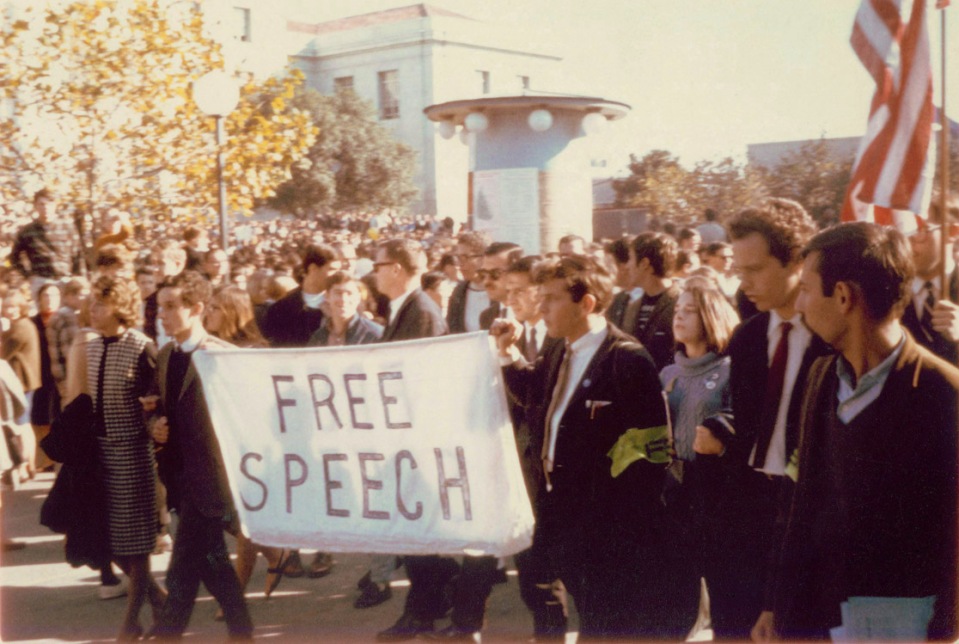
There has been an alarming trend in modern culture: numerous political and social activist groups have been attempting to use the pernicious and false doctrines of political correctness, tolerance, and diversity to silence those they disagree with. Many of these groups have sought the passage of so-called “hate speech” laws designed to silence voices of dissent.
At public colleges and universities, places where free speech and open debate should be actively encouraged, measures – including protests, disruption, and, in some cases, outright violence – taken to suppress voices of dissent has become tantamount to Government censorship. This censorship prevents students from inviting the speakers they wish to hear and debate speech they disagree with. Eva Fourakis, the editor-in-chief of The Williams Record (the student newspaper of Williams College) wrote an editorial, later recanted, commenting that “some speech is too harmful to invite to campus.” The editorial went on to say: “students should not face restrictions in terms of the speakers they bring to campus, provided of course that these speakers do not participate in legally recognised forms of hate speech.”
The University of California, Berkeley, is famous for sparking the free speech movement of the 1960s. Today, however, it has become a haven for radical, anti-free speech Neo-Marxists and social justice warriors. Not only have many Republican students had their personal property destroyed, but numerous conservative speakers have had their talks disturbed, and, in some cases, halted altogether. In February, Antifa – so-called anti-fascists – set fires and vandalised building during a speech by the controversial journalist, Milo Yiannopoulos (1984 – ). In April, threats of violence aimed at members of the Young Americas Foundation forced political commentator, Ann Coulter (1961 – ), to cancel her speech. A speech by David Horowitz (1939 – ), founder and president of the David Horowitz Freedom Center, was cancelled after organisers discovered that the event would take place during normal class times (for safety, or so they claimed). Finally, the conservative journalist, Ben Shapiro (1984 – ), was forced to spend US$600,000 on security for his speech at UC Berkeley. These events show that those who wish to use disruption, vilification, threats, and outright violence to silence others can be, and often are, successful in doing so.

Like most the principles of classical liberalism, free speech developed through centuries of political, legal, and philosophical progress. And like many Western ideas, its development can be traced back to the Ancient Greeks. During his trial in Athens in 399BC, Socrates (470BC – 399BC) expressed the belief that the ability to speak was man’s most divine gift. “If you offered to let me off this time on condition I am not any longer to speak my mind”, Socrates stated, “I should say to you, ‘Men of Athens, I shall obey the Gods rather than you.”
Sixteen hundred years later, in 1215, the Magna Carta became the founding document of English liberty. In 1516, Desiderius Erasmus (1466 – 1536) wrote in the Education of a Christian Prince that “in a free state, tongues too should be free.” In 1633, the astronomist Galileo Galilei was put on trial by the Catholic Church for refusing to retract his claim of a heliocentric solar system. In 1644, the poet, John Milton (1608 – 1674), author of Paradise Lost, warned in Areopagictica that “he who destroys a good book kills reason itself.” Following the usurpation of King James II (1633 – 1701) by William III (1650 – 1702) and Mary II (1662 – 1694) in 1688, the English Parliament passed the English Bill of Rights which guaranteed free elections, regular parliaments, and freedom of speech in Parliament.
In 1789, the French Declaration of the Rights of Man and of the Citizen, an important document of the French revolution, provided for freedom of speech (needless to say, Robespierre and company were not very good at actually promoting this ideal). That same year, the philosopher Voltaire (1694 – 1778) famously wrote: “I detest what you write, but I would give my life to make it possible for you to continue to write.” Over in the United States, in 1791, the first amendment of the US Bill of Rights guaranteed freedom of religion, freedom of speech, freedom of the press, and the right to assemble:
ARTICLE [I] (AMENDMENT 1 – FREEDOM OF SPEECH AND RELIGION)
Congress shall make no law respecting an establishment of religion, or prohibiting the free exercise thereof; or abridging the freedom of speech, or of the press; or the right of people peaceably to assemble, and to petition the Government for a redress of grievances.”
During the 19th century, the British philosopher, John Stuart Mill (1806 – 1873) argued for toleration and individuality in his 1859 essay, On Liberty. “If any opinion is compelled to silence”, Mill warned, “that opinion may, for aught we can certainly know, be true. To deny this is to presume our own infallibility.” Mill believed that all doctrines, no matter how immoral or offensive, ought to be given public exposure. He stated in On Liberty:
“If the argument of the present chapter are of any validity, there ought to exist the fullest liberty of professing and discussing, as a matter of ethical conviction, any doctrine, however immoral it may be considered.”
Elsewhere in On Liberty, Mill warned that the suppression of one voice was as immoral as the suppression of all voices:
“If all mankind minus one were of one opinion, and only one person were of the contrary opinion, mankind would be no more justified in silencing that one person than he, if he had the power, would be justified in silencing mankind.”
Centuries later, in 1948, the Universal Declaration of Human Rights, accepted unilaterally by the United Nations, urged member states to promote civil, human, economic, social, and political rights – including freedom of expression and religion.
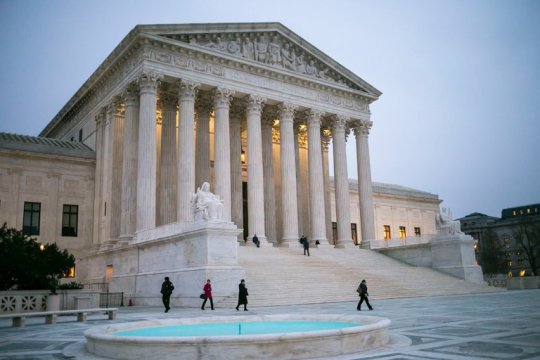
Supreme Court
Within the American Justice System, numerous Supreme Court cases have created judicial protections for freedom of speech. In the case of the Nationalist Socialist Party of America v. Village of Stoke (1977), the Supreme Court upheld the right of neo-Nazis to march through a village with a large Jewish population and wear Nazi insignia. The Justices found that the promotion of religious hatred was not a sufficient reason to restrict free speech.
In the city of St. Paul during the early 1990s, a white teenager was arrested under the “Bias-Motivated Crime Ordinance” after he burnt a cross made of a broken chair (cross-burning is commonly used by the Ku Klux Klan to intimidate African Americans) in the front yard of an African American family. The Court ruled that the city’s Ordinance was unconstitutional. Justice Antonin Scalia (1936 – 2016), noted that the purpose of restricting fighting words was to prevent civil unrest, not to ban the content or message of the speaker’s words. Scalia wrote in the case of R.A.V. v. City of St. Paul (1992):
“The ordinance applies only to ‘fighting words’ that insult, or provoke violence, ‘on the basis of race, colour, creed, religion or gender.’ Displays containing abusive invective, no matter how vicious or severe, are permissible unless they are addressed to one of the specified disfavored topics. Those who wish to use ‘fighting words’ in connection with other ideas—to express hostility, for example, on the basis of political affiliation, union membership, or homosexuality—are not covered. The First Amendment does not permit St. Paul to impose special prohibitions on those speakers who express views on disfavored subjects.”
In the Matal v. Tam case (2017), the Supreme Court found that a provision within the Lanham Act prohibiting the registration of trademarks that disparaged persons, institutions, beliefs, or national symbols violated the First Amendment. Justice Samuel Alito (1950 – ) opined:
“[The idea that the government may restrict] speech expressing ideas that offend … strikes at the heart of the First Amendment. Speech that demeans on the basis of race, ethnicity, gender, religion, age, disability, or any other similar ground is hateful; but the proudest boast of our free speech jurisprudence is that we protect the freedom to express ‘the thought that we hate’.”
Justice Anthony Kennedy (1936 – ) opined:
“A law found to discriminate based on viewpoint is an “egregious form of content discrimination,” which is “presumptively unconstitutional.” … A law that can be directed against speech found offensive to some portion of the public can be turned against minority and dissenting views to the detriment of all. The First Amendment does not entrust that power to the government’s benevolence. Instead, our reliance must be on the substantial safeguards of free and open discussion in a democratic society.”

In recent years, numerous calls to ban speech have been justified on the basis that it is “hateful.” Much of this has come from the political left who (in what one may cynically regard as having more to do with silencing voices of dissent than with protecting vulnerable groups) argue that restrictions on hate speech must occur if minorities are to be given equal status with everyone else.
That certain types of speech can be offensive, and that some of that speech may be aimed at certain groups of people, is undeniable. Hate speech has even been criticised for undermining democracy! In an article, Alexander Tsesis, Professor of Law at Loyola University, wrote: “hate speech is a threatening form of communication that is contrary to democratic principles.” Some have even argued that hate speech violates the fourteenth amendment to the US Constitution which guarantees equal protection under the law:
Article XIV (AMENDMENT 14 – RIGHTS GUARANTEED: PRIVILEGES AND IMMUNITIES OF CITIZENSHIP, DUE PROCESS, AND EQUAL PROTECTION)
1: All persons born or naturalised in the United States, and subject to the jurisdiction thereof, are citizens of the United States and of the State wherein they reside. No state shall make or enforce any law which shall abridge the privileges or immunities of citizens of the United States; nor shall any State deprive any person of life, liberty, or property, without due process of law; nor deny any person within its jurisdiction the equal protection of the laws.
That there is a historical basis for restricting hate speech is undeniable. Slavery, Jim Crow, and the Holocaust, among other atrocities, were all proceeded by violent and hateful rhetoric. (Indeed, incitement to genocide is considered a serious war crime and a serious crime against humanity under international law.) Genocide is almost always preceded by hate speech. However, what proponents of hate speech laws fail to realise is that the countries that perpetrated these atrocities did not extend the freedom to speak to the groups that they were targeting. Joseph Goebbels (1897 – 1945), the Nazi minister for public enlightenment and propaganda, for example, had such an iron grip on Germany’s media that any voice contradicting the Nazi’s anti-Semitic propaganda had no opportunity to be heard.

But who, exactly, supports hate speech laws? Analysis of survey data taken from Pew Research Center and YouGov reveals that it is primarily non-white, millennial democrats. In terms of age, the Pew Research Centre found that forty-percent of millennials supported Government censorship of hate speech, compared to twenty-seven percent of gen x-ers, twenty-four percent of baby-boomers, and only twelve percent of the silent generation.
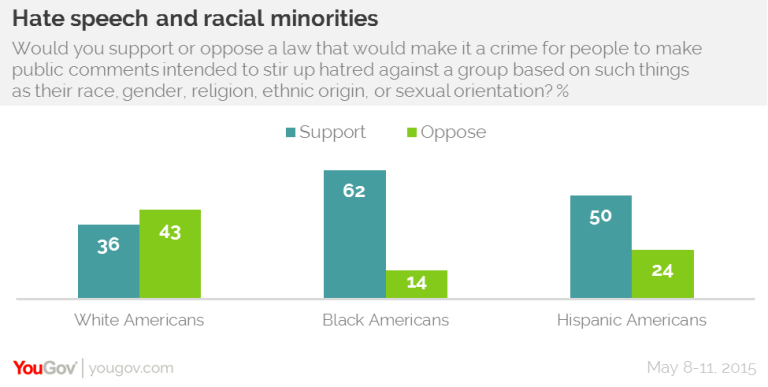
In terms of race, research by YouGov reveals that sixty-two percent of African Americans support Government censorship of hate speech, followed by fifty percent of Hispanics, and thirty-six percent of White Americans.
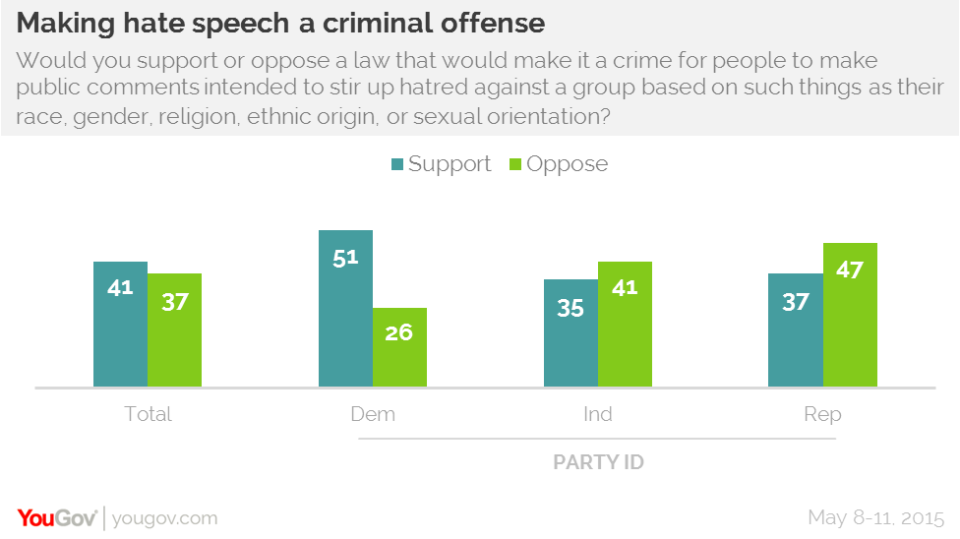
In terms of political affiliation, research from YouGov taken in 2015 found that fifty-one percent of Democrats supported restrictions on hate speech, compared to thirty-seven percent of Republicans, and only thirty-five percent of independents.
The primary issue with hate speech is that determining what it does and does not constitute is very difficult. (The cynic may argue, fairly, that hate speech begins when the speaker expresses a view or states a fact or expresses an opinion that another person does not want others to hear.) As Christopher Hitchens (1949 – 2011) pointed out, the central problem with hate speech is that someone has to decide what it does and does not constitute.
The second issue with hate speech laws is that they can easily be used by one group to silence another. Often this kind of censorship is aimed at particular groups of individuals purely for ideological and/or political purposes, often with the justification that such actions increase the freedom and equality of the people the advocates claim to represent.
In Canada, Bill C-16 has sought to outlaw “hate propaganda” aimed at members of the community distinguishable by their gender identity or expression. The Bill originated with a policy paper by the Ontario Human Rights Commission which sought to determine what constituted discrimination against gender identity and expression. This included “refusing to refer to a person by their self-identified name and proper personal pronoun.” Supporters of Bill C-16 see it as an important step towards the creation of legal protections for historically marginalised groups. Detractors, however, have expressed concern that the Bill creates a precedence for Government mandated speech.
The Canadian clinical psychologist and cultural critic, Professor Jordan Peterson (1962 – ), first came to public attention when he posted a series of YouTube videos warning of the dangers of political correctness and criticising Bill C-16. In his videos, Professor Peterson warned that the law could be used to police speech and compel individuals to use ‘transgender pronouns’ (these are terms like ‘ze’ and ‘zer’, among others). For his trouble, Peterson has been accused of violence by a fellow panellist on the Agenda with Steve Palkin, received two warning letters from the University of Toronto in 2016, and was denied a social research grant from Canada’s Social Sciences and Humanities Research Council.
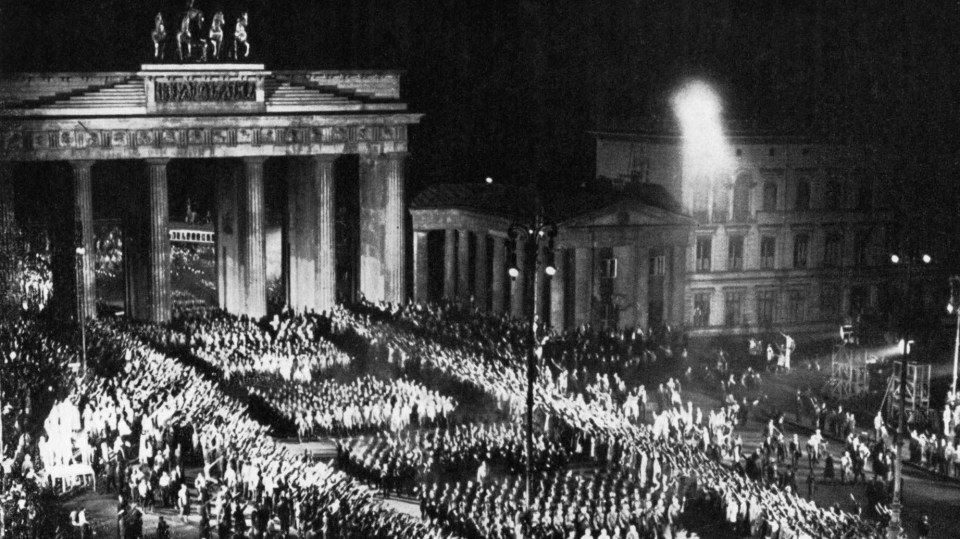
A Nazi torch-light rally.
Europe has been experiencing similar attempts to silence speech. A law passed in the Bundestag this year will force social media companies operating in Germany to delete racist or slanderous comments and posts within twenty-four hours or face a fine of up to €50 million if they fail to do so. Additionally, numerous public figures have found themselves charged with hate speech crimes for merely pointing out the relationship between the large influx of non-European migrants and high crime rates, particularly in terms of rape and terrorism. One politician in Sweden was prosecuted for daring to post immigrant crime statistics on Facebook.
In Great Britain, British Freedom of Information documents reveal that around twenty-thousand adults and two-thousand children had been investigated by the police for comments that made online. In politics, British MP, Paul Weston (1965 – ), found himself arrested after he quoted a passage on Islam written by Winston Churchill (1874 – 1965). In Scotland, a man was charged under the 2003 Communication’s Act with the improper use of electronic communications after he filmed his dog making a Hitler salute.
In Australia, Herald Sun columnist, Andrew Bolt (1959 – ), was found to have contravened section 18C of the Racial Discrimination Act after he published articles accusing fair-skinned Aborigines of using their racial status for personal advantages. The law firm, Holding Redlich, speaking for a group of Aboriginal persons, demanded that the Herald Sun retract two Andrew Bolt articles, written in April and August of 2009, and restrain Bolt from writing similar articles in the future. Joel Zyngier, who acted for the group pro-bono, told Melbourne’s The Age:
“We see it as clarifying the issue of identity—who gets to say who is and who is not Aboriginal. Essentially, the articles by Bolt have challenged people’s identity. He’s basically arguing that the people he identified are white people pretending they’re black so they can access public benefits.”
Judge Morcedai Bromberg (1959 – ) found that the people targeted by Bolt’s articles were reasonably likely to have been “offended, insulted, humiliated, or intimidated.”
We need speech to be as free as possible because it is that which allows us to exchange and critique information. It through free speech that we are able to keep our politicians and public officials in check, that we are able to critique public policy, and that we are able to disseminate information. As the Canadian cognitive psychologist, Stephen Pinker (1954 – ), observed: “free speech is the only way to acquire knowledge about the world.” Measures taken to restrict free speech, whether it be the criminalization of hate speech or any other, is a complete contradiction of the principles that free Western democracies are founded upon.
